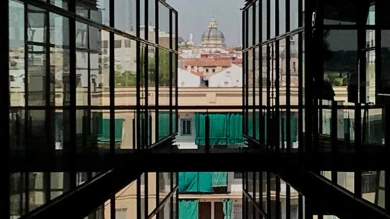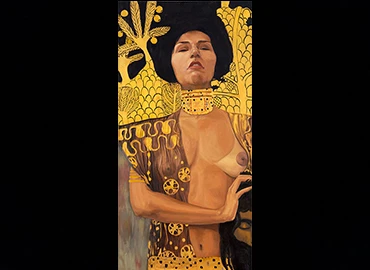-
30 de junio y 7 de julio, 2018 – 19:00 h / Edificio Sabatini, Auditorio
Queerama. Daisy Asquith
Intervalo 15
Queerama reconstruye la historia de los movimientos LGTBIQ+ y de sus representaciones en el cine y en la cultura popular desde comienzos del siglo XX hasta hoy a partir del montaje de fragmentos de informativos, documentales y cine de ficción procedentes del ingente archivo fílmico del British Film Institute (BFI). La película atraviesa un conjunto polifónico de experiencias de diversidad sexual, que incluyen persecuciones públicas y condenas judiciales, criminalización y patologización, pero también liberación sexual, tácticas de visibilidad y orgullo, y conquista de derechos. La banda sonora de John Grant, Goldfrapp y Hercules & Love Affair complementa las imágenes y nos sumerge en la historia de las relaciones, deseos, miedos y expresiones de disidencia a la norma heterosexual.

-
3 de julio, 2018 – 18:00 h / Edificio Nouvel, Centro de Documentación
¿Archivo Queer?
Una activación
¿Archivo queer? es un proyecto de colaboración impulsado desde 2012 por el Museo Reina Sofía. A la investigación que realizaron, dentro del programa de Residencias de Investigación 2013-2014, Sejo Carrascosa, Lucas Platero, Andrés Senra y Fefa Vila, cuyo objeto fue pensar un archivo a partir de un cuestionamiento queer de los principios que rigen el archivo institucional clásico, se sumó el Centro de Documentación del Museo, cuyo equipo se ocupó de la recopilación de la documentación, las negociaciones con los activistas y su posterior catalogación e integración en las colecciones documentales del Museo.
En esta ocasión, el equipo del Centro de Documentación que participó en el proceso de recopilación y catalogación propone una visita comentada al archivo.
Aforo: 15 personas
Plazas agotadas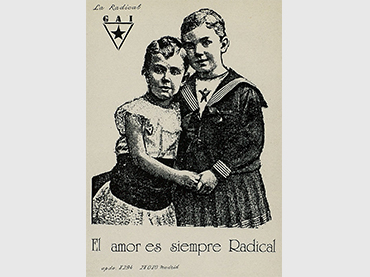
-
Miércoles 4 de julio, 2018 Sala de Protocolo, Nouvel
Voces situadas 2
Otros orgullos
Tras el primer encuentro del programa Voces situadas, celebrado el pasado mes de marzo, que ponía el foco en torno a los distintos feminismos actuales surgidos desde identidades diversas y hasta ahora poco visibilizados, este segundo foro reúne a representantes de colectivos que quieren diferenciarse críticamente de la convocatoria general, afirmándose ante los procesos de exclusión y normalización que, desde su punto de vista, domestican el desacuerdo con los patrones sexuales y de género dominantes.
Las voces de la periferia han sido particularmente activas en los últimos años en la contestación de un modelo de celebración que tiende a invisibilizar la diversidad y los problemas reales de la gran masa del colectivo LGTBQ que habita fuera de los centros metropolitanos. Entre los colectivos que participarán en este foro se encuentran el Orgullo Vallekano, el Orgullo Periférico y los Migrantes transgresorxs.
Participan:
Javier F. Bujarrabal y Silvia Hernández de Dios (Orgullo Periférico)
Francisco Godoy Vega y Kimmy/Leticia Rojas Miranda (Migrantes Transgresorxs)
José Alberto Castillo y Silvia Iturraspe (Orgullo Vallekano)En el marco de la serie:
Voces situadas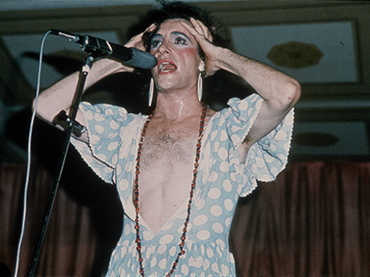
-
4, 5 y 6 de julio, 2018
“Hablo por mi diferencia”
Un recorrido LGTBIQ+ por la Colección
Miércoles 4 de julio 19:30 h
Jueves 5 de julio 19:30 h
Viernes 6 de julio 19:30 h
Punto de encuentro: conexión entre Edificio Sabatini y Edificio Nouvel, Planta 1El itinerario Hablo por mi diferencia es un recorrido por la España de la segunda mitad de la década de los setenta que desafiaba las convenciones morales del franquismo. Estas salas de la Colección centran su atención en la gestación de la contracultura y en la “Ley de peligrosidad y rehabilitación social” como detonante de la principal reivindicación política de esos años, convertida en símbolo de lucha por las libertades. Esta confrontación se visibilizó en manifestaciones muchas veces no exentas de polémicas por el espíritu transgresor de las acciones de protesta organizadas en las calles.
Algunos de los artistas que componen este recorrido guiado por la Colección desde una lectura en clave de la disidencia sexual se encuentran: Colita, Pedro Lemebel, Joaquín de Molina, Nazario, Ocaña, Manuel Quejido, Sergio Zevallos o Iván Zulueta, entre otros.

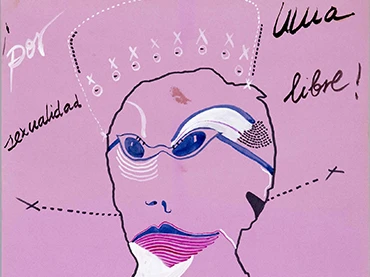
Held on 30 Jun 2018
En el marco de las conmemoraciones de la revuelta de Stonewall, ocurrida en Nueva York el 28 de junio de 1969, el Museo Reina Sofía ha programado un conjunto de actividades (de debate, cine, visitas a la Colección y al ¿Archivo Queer?) que se inscriben en algunas líneas permanentes de trabajo del Museo sobre la disidencia sexual y los múltiples ejercicios de libertad que ponen en cuestión la norma heteropatriarcal.
Si la resistencia a la violencia institucional y la crítica de la norma fueron las estrategias centrales de los años ‘80-‘90 frente a los procesos de “normalización” de la homosexualidad y a la crisis del SIDA, los primeros años del nuevo siglo abren la posibilidad de inventar nuevas formas de subjetivación y de producción social desde la enunciación orgullosa de la diferencia. El conjunto de actividades reunidas a lo largo de esta semana articula, entonces, el rescate de memorias disidentes con los debates sobre la actualidad y las derivas futuras del movimiento LGTBIQ+, en pos de reivindicar los múltiples modos de vivir una sexualidad libre.
Esta serie de actividades se enmarcan en el conjunto de iniciativas anteriores tales como el programa Prácticas Críticas. Somateca (2012-2014), las Jornadas Crip-Queer. Cuerpos abyectos entrelazando vidas (2014), la proyección del documental Yes we fuck! (2015) o la performance The Touching Community (2017), con las que el Museo Reina Sofía aspira a participar en la construcción colectiva de un entramado de pensamiento, investigación e imaginación radical en torno al cruce entre lenguajes artísticos, pensamiento crítico y activismos LGTBIQ+.
Organised by
Museo Reina Sofía


Más actividades
![Tracey Rose, The Black Sun Black Star and Moon [La luna estrella negro y negro sol], 2014.](https://recursos.museoreinasofia.es/styles/small_landscape/public/Obra/AD07091_2.jpg.webp)
On Black Study: Towards a Black Poethics of Contamination
Monday 27, Tuesday 28 and Wednesday 29 of April, 2026 – 16:00 h
The seminar On Black Study: Towards a Black Poethics of Contamination proposes Black Study as a critical and methodological practice that has emerged in and against racial capitalism, colonial modernity and institutional capture. Framed through what the invited researcher and practitioner Ishy Pryce-Parchment terms a Black poethics of contamination, the seminar considers what it might mean to think Blackness (and therefore Black Study) as contagious, diffuse and spreadable matter. To do so, it enacts a constellation of diasporic methodologies and black aesthetic practices that harbor “contamination” -ideas that travel through texts, geographies, bodies and histories- as a method and as a condition.
If Blackness enters Western modernity from the position of the Middle Passage and its afterlives, it also names a condition from which alternative modes of being, knowing and relating are continually forged. From within this errant boundarylessness, Black creative-intellectual practice unfolds as what might be called a history of touches: transmissions, residues and socialities that unsettle the fantasy of pure or self-contained knowledge.
Situated within Black radical aesthetics, Black feminist theory and diasporic poetics, the seminar traces a genealogy of Black Study not as an object of analysis but as methodological propositions that continue to shape contemporary aesthetic and political life. Against mastery as the horizon of study, the group shifts attention from what we know to how we know. It foregrounds creative Black methodological practices—fahima ife’s anindex (via Fred Moten), Katherine McKittrick’s expansive use of the footnote, citation as relational and loving labour, the aesthetics of Black miscellanea, and Christina Sharpe’s practices of annotation—as procedures that disorganise dominant regimes of knowledge. In this sense, Black Study is approached not as a discrete academic field but as a feel for knowing and knowledge: a constellation of insurgent practices—reading, gathering, listening, annotating, refusing, world-making—that operate both within and beyond the university.
The study sessions propose to experiment with form in order to embrace how ‘black people have always used interdisciplinary methodologies to explain, explore, and story the world.’ Through engagements with thinkers and practitioners such as Katherine McKittrick, C.L.R. James, Sylvia Wynter, Christina Sharpe, Fred Moten, Tina Campt, Hilton Als, John Akomfrah, fahima ife and Dionne Brand, we ask: What might it mean to study together, incompletely and without recourse to individuation? How might aesthetic practice function as a poethical intervention in the ongoing work of what Sylvia Wynter calls the practice of doing humanness?

Intergenerationality
Thursday, 9 April 2026 – 5:30pm
This series is organised by equipoMotor, a group of teenagers, young people and older people who have participated in the Museo Reina Sofía’s previous community education projects, and is structured around four themed blocks that pivot on the monstrous.
The third session gazes at film as a place from which to dismantle the idea of one sole history and one sole time. From a decolonial and queer perspective, it explores films which break the straight line of past-present-future, which mix memories, slow progress and leave space for rhythms which customarily make no room for official accounts. Here the images open cracks through which bodies, voices and affects appear, disrupting archive and questioning who narrates, and from where and for whom. The proposal is at once simple and ambitious: use film to imagine other modes of remembering, belonging and projecting futures we have not yet been able to live.

Remedios Zafra
Thursday March 19, 2026 - 19:00 h
The José Luis Brea Chair, dedicated to reflecting on the image and the epistemology of visuality in contemporary culture, opens its program with an inaugural lecture by essayist and thinker Remedios Zafra.
“That the contemporary antifeminist upsurge is constructed as an anti-intellectual drive is no coincidence; the two feed into one another. To advance a reactionary discourse that defends inequality, it is necessary to challenge gender studies and gender-equality policies, but also to devalue the very foundations of knowledge in which these have been most intensely developed over recent decades—while also undermining their institutional support: universities, art and research centers, and academic culture.
Feminism has been deeply linked to the affirmation of the most committed humanist thought. Periods of enlightenment and moments of transition toward more just social forms—sustained by education—have been when feminist demands have emerged most strongly. Awareness and achievements in equality increase when education plays a leading social role; thus, devaluing intellectual work also contributes to harming feminism, and vice versa, insofar as the bond between knowledge and feminism is not only conceptual and historical, but also intimate and political.
Today, antifeminism is used globally as the symbolic adhesive of far-right movements, in parallel with the devaluation of forms of knowledge emerging from the university and from science—mistreated by hoaxes and disinformation on social networks and through the spectacularization of life mediated by screens. These are consequences bound up with the primacy of a scopic value that for some time has been denigrating thought and positioning what is most seen as what is most valuable within the normalized mediation of technology. This inertia coexists with techno-libertarian proclamations that reactivate a patriarchy that uses the resentment of many men as a seductive and cohesive force to preserve and inflame privileges in the new world as techno-scenario.
This lecture will address this epochal context, delving into the synchronicity of these upsurges through an additional parallel between forms of patriarchal domination and techno-labor domination. A parallel in which feminism and intellectual work are both being harmed, while also sending signals that in both lie emancipatory responses to today’s reactionary turns and the neutralization of critique. This consonance would also speak to how the perverse patriarchal basis that turns women into sustainers of their own subordination finds its equivalent in the encouraged self-exploitation of cultural workers; in the legitimation of affective capital and symbolic capital as sufficient forms of payment; in the blurring of boundaries between life and work and in domestic isolation; or in the pressure to please and comply as an extended patriarchal form—today linked to the feigned enthusiasm of precarious workers, but also to technological adulation. In response to possible resistance and intellectual action, patriarchy has associated feminists with a future foretold as unhappy for them, equating “thought and consciousness” with unhappiness—where these have in fact been (and continue to be) levers of autonomy and emancipation.”
— Remedios Zafra

ARCO2045. The Future, for Now
Saturday 7, March 2026 - 9:30pm
The future, its unstable and subjective nature, and its possible scenarios are the conceptual focus of ARCOmadrid 2026. A vision of the future linked to recent memory, a flash of insight into a double-edged sword. This year's edition, as in the previous two, will once again hold its closing party at the Reina Sofia Museum. This time, the star of the show is Carles Congost (Olot, Girona, 1970), one of the artists featured in the new presentation of the Collections recently inaugurated on the 4th floor of the Sabatini Building.
Carles Congost, with his ironic and timeless gaze, is responsible for setting the tone for this imperfect future, with a DJ session accompanied by some of his works in the Cloister on the first floor of the Sabatini Building of the Museo on the night of Saturday 7 March.

27th Contemporary Art Conservation Conference
Wednesday, 4, and Thursday, 5 March 2026
The 27th Contemporary Art Conservation Conference, organised by the Museo Reina Sofía’s Department of Conservation and Restoration, with the sponsorship of the Mapfre Foundation, is held on 4 and 5 March 2026. This international encounter sets out to share and debate experience and research, open new channels of study and reflect on conservation and the professional practice of restorers.
This edition will be held with in-person and online attendance formats, occurring simultaneously, via twenty-minute interventions followed by a five-minute Q&A.
